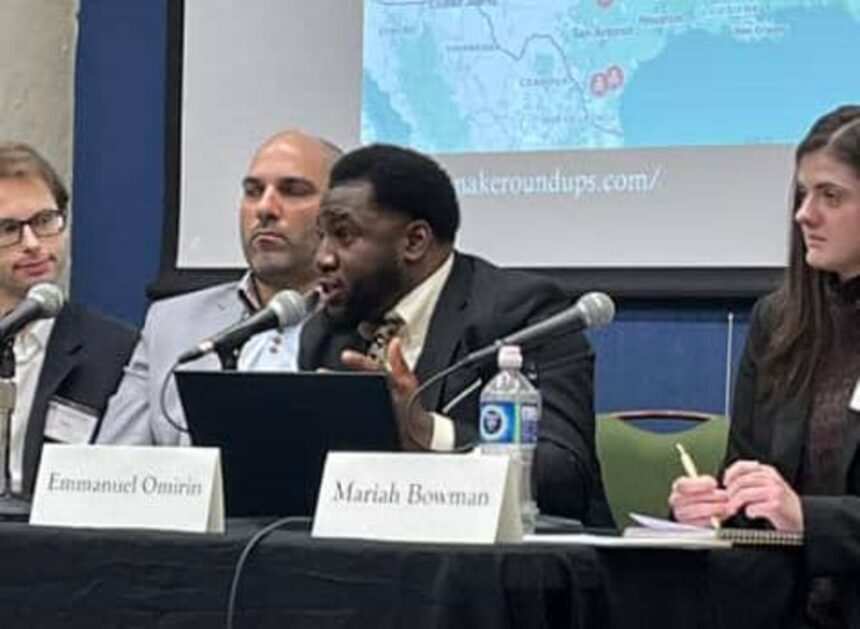A recent presentation at the 21st International Wildlife Conference highlighted the devastating impact of oil spills on wildlife in Nigeria’s Ogoniland region, emphasising the urgent need for stronger legal protections to safeguard the region’s biodiversity.
Emmanuel Kayode Omirin, a Master of Laws (LL.M.) in Environmental Law with a concentration in Animal Law, presented a paper titled ‘Protecting Wildlife from Oil Spills in Nigeria’s Ogoniland – A Gap-Filling Approach’.
Omirin stated, “Imagine a land once teeming with wildlife but now barren and silent. This is the reality in this oil-rich region. But it does not have to be this way.”
The call was made at the presentation of the 21st International Wildlife Conference held at Stetson University School of Law, Gulfport, Florida, United States, on April 9, 2025.
Omirin’s topic centred on ‘Protecting Wildlife from Oil Spills in Nigeria’s Ogoniland – A Gap-Filling Approach’.
Ogoniland, home to endangered species like the Nigeria-Cameroon chimpanzee and the Niger Delta Elephant, has faced extensive environmental degradation due to oil exploration activities. Omirin noted that “exploitation destroyed wildlife habitats, killed many, and forced the survivors to escape for their dear lives to areas that might not be favourable for their survival.”
The conference highlighted gaps in Nigerian laws that fail to protect wildlife from oil spills, including non-justiciable environmental and wildlife protection matters and weak regulatory oversight. Omirin emphasized that “the federal agencies regulating oil spills are underfunded, understaffed, and ill-equipped.”
To address these issues, Omirin recommended concurrent regulatory oversight between state and federal governments on oil-related matters and making post-impact assessments mandatory after oil spills. “The Post Impact Assessment should not only assess the environment but also the lives of the wildlife in that region,” he said.
Omirin also called for the amendment of the Endangered Species Act to cater to habitat destruction and modern threats to wildlife’s existence. “The current Endangered Species Conservation and Protection Bill in the Nigerian National Assembly seems to be a step towards wildlife protection. I call on the National Assembly to fast-track the passage of the bill for the sake of Nigerian wildlife, which is declining every day,” he urged.
Furthermore, Omirin highlighted the issue of regulatory capture, where federal agencies rely on the industry they regulate for resources, funds, equipment, and support. This, he noted, results in slow response to oil spills. He emphasized the need for well-funded and adequately staffed regulatory agencies to address oil spills more quickly.
Omirin also discussed the importance of strategic litigation in protecting wildlife. He cited the case of Centre for Oil Pollution Watch v. NNPC, where the plaintiff framed non-justiciable environmental and wildlife protection matters as human rights issues. “Lawyers and advocates should explore strategic litigation options to institute an action to protect wildlife,” he said.
He emphasised the need for collective action to protect Nigerian wildlife.
Omirin said, “Now is the time for us to protect Nigerian wildlife. Either through legal reforms or strategic litigation, the change begins with you and me—lawyers, NGOs, advocates, and ordinary citizens. Let us protect our wildlife not only for this generation but also for the generation to come.”
WATCH TOP VIDEOS FROM NIGERIAN TRIBUNE TV
- Let’s Talk About SELF-AWARENESS
- Is Your Confidence Mistaken for Pride? Let’s talk about it
- Is Etiquette About Perfection…Or Just Not Being Rude?
- Top Psychologist Reveal 3 Signs You’re Struggling With Imposter Syndrome
- Do You Pick Up Work-Related Calls at Midnight or Never? Let’s Talk About Boundaries






